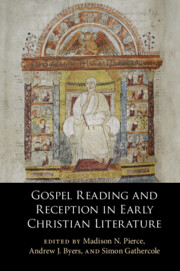Book contents
- Gospel Reading and Reception in Early Christian Literature
- Gospel Reading and Reception in Early Christian Literature
- Copyright page
- Dedication
- Contents
- Contributors
- Foreword: We Are All Gospel Readers
- Introduction
- Part I Reading the Gospel in Israel’s Scriptures
- 1 Reading the Old Testament Christologically
- 2 Where Is the “God of Israel” in Paul’s Reading of the Gospel?
- 3 Gospel Reading and Prosopological Exegesis in Luke-Acts
- Part II Gospel Writers as Gospel Readers
- Part III Gospel Reading as Ecclesial Tradition
- Bibliography
- Index of Ancient Sources
- Index of Modern Authors
- Index of Subjects
1 - Reading the Old Testament Christologically
from Part I - Reading the Gospel in Israel’s Scriptures
Published online by Cambridge University Press: 27 January 2022
- Gospel Reading and Reception in Early Christian Literature
- Gospel Reading and Reception in Early Christian Literature
- Copyright page
- Dedication
- Contents
- Contributors
- Foreword: We Are All Gospel Readers
- Introduction
- Part I Reading the Gospel in Israel’s Scriptures
- 1 Reading the Old Testament Christologically
- 2 Where Is the “God of Israel” in Paul’s Reading of the Gospel?
- 3 Gospel Reading and Prosopological Exegesis in Luke-Acts
- Part II Gospel Writers as Gospel Readers
- Part III Gospel Reading as Ecclesial Tradition
- Bibliography
- Index of Ancient Sources
- Index of Modern Authors
- Index of Subjects
Summary
For the writers of the books of the New Testament, as well as for Christians thereafter, “gospel reading” included reading the books of the Jewish Scriptures, which were understood to bear witness to the coming of Christ (cf. e.g. Matt. 1:22–23 and Isa. 7:14) and thereby to the gospel (e.g. Gal. 3:8–13 and Gen. 15:6). Subsequently, “Christological readings” of what became the Christian Old Testament took a variety of forms, many of which moved beyond identifying prophetic predictions of the coming Messiah to attempts to identify the preincarnate Word as a distinct agent in the Old Testament books. Although such strategies have long been called into question on historical-critical grounds, this essay will argue that there are also specifically Trinitarian reasons for eschewing such approaches to the text, arguing instead that a more faithfully Christological reading of Israel’s Scriptures will focus not on the whereabouts of the preincarnate Word, but on the topic of YHWH’s presence in and to Israel, as that which assumes new and unpredictable but nevertheless consistent form in the incarnation. This chapter explores a form of theological “gospel reading” in which early Christian writers, steeped in the Jewish scriptural traditions, discerned in Jesus the activity and presence of Israel’s God.
Keywords
- Type
- Chapter
- Information
- Publisher: Cambridge University PressPrint publication year: 2022

